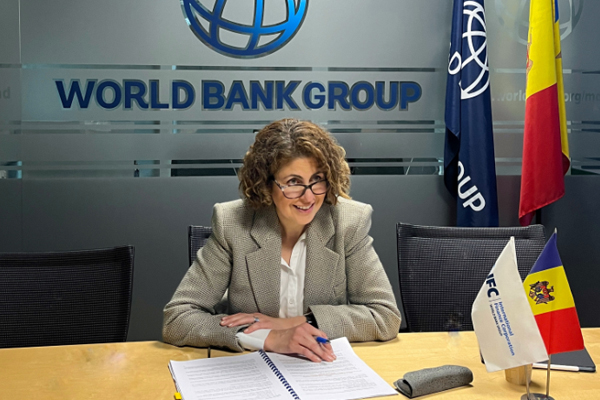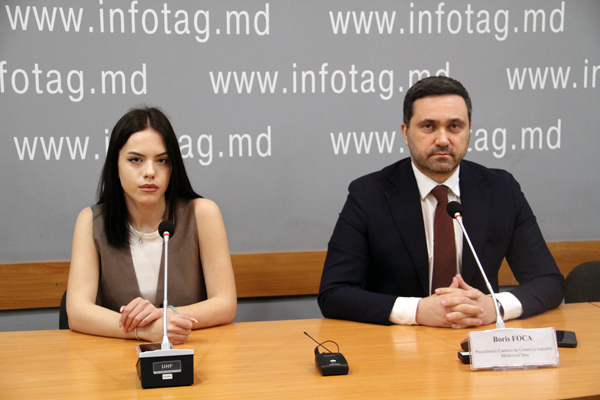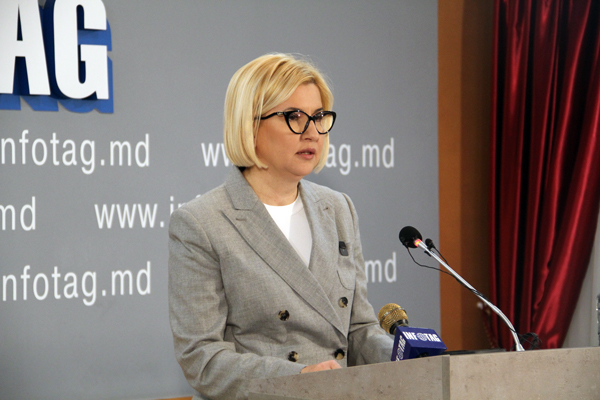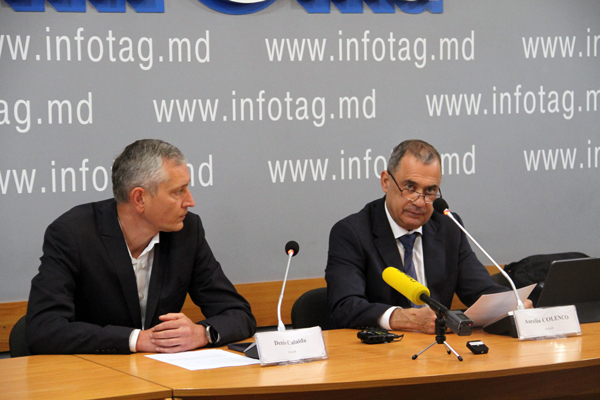Interview
RANA KARADSHEH: IFC IS ENCOURAGING MOLDOVAN GOVERNMENT TO BOOST PRIVATE SECTOR ENGAGEMENT

Interview given to the INFOTAG news agency's reporter Margareta Mocreac by International Financial Corporation's (IFC) Regional Director for Europe Rana Karadsheh, who visited Moldova on 3-4 May.
INFOTAG: Dear Ms Karadsheh, please tell us your goals in visiting Moldova?
R.K.:This is my first visit to Moldova as the IFC Regional Director. I am very excited to be here. I have met Prime Minister Dorin Recean and representatives of the business community.
Also, very importantly, I have come to Chisinau to sign an investment agreement with Moldova's largest bank, maib. This is IFC’s first commitment in Moldova for a number of years, so I am very excited to do this.
INFOTAG: Could you please give us some details about the investment agreement with maib?
R.K.:It is an investment agreement of approximately 20 million euros and it
has a few components. Most of the funds will target small and medium-sized enterprises (SMEs), which are very important parts of the Moldovan economy.
What is especially exciting about this project is that about 50% of the funds will go to SMEs headed by women. I would like to note that gender is a very important priority for IFC.
We know that a lot of refugees have come to Moldova after Russia’s invasion of Ukraine in February 2022. Many of them are women and children. So, we hope that some of the 50% of the SMEs support which is targeted towards women will be used to support Ukrainian women wishing to start small businesses in Moldova.
The other thing that we are supporting through the investment agreement with maib is putting in place a digital data corridor in the countries around Ukraine. This will allow financial institutions to have data connectivity with Ukrainian refugees and with banks back in Ukraine to allow people to obtain credits in Moldova and to get their financial information here in a secure way.
So, the partnership with maib is going to have several different components.
INFOTAG: How would you describe cooperation between IFC and Moldova so far, and what is in the pipeline for the future?
R.K.: I would say that right now we have a very good dialogue with the government and I'm really hopeful that there will be more that we can do. IFC has not invested in Moldova for a while, but this is changing now.
At the same time, I would like to mention that our advisory team has been working with the government and its agencies on improving the business environment. One thing in particular that we have been working on, in partnership with our World Bank colleagues, is the Food Safety Advisory Program.
Through this program, which was focused on the poultry and dairy sectors, Moldova is now able to export some processed meat, dairy products and eggs into the EU.
This is as a direct result of cooperation with IFC and its advisory services.
INFOTAG: What advice would you give to the government and to the private sector, who are now both looking towards Western markets?
R.K.: Improving the business environment will enable the private sector to grow. It will attract private capital, which in turn will stimulate and create a more robust economy, not just for domestic consumption, but for export.
I know that the government is now passing some laws to facilitate export and import, such as customs regulation and a tax code. All this is very good.
INFOTAG: IFC has recently conducted a private sector assessment in Moldova. Could you please elaborate on its findings and conclusions?
R.K.: What is called the Country Private Sector Diagnostic (CPSD), identifies opportunities for private-sector led growth and investment, as well as solutions to remove sector-specific and economy-wide constraints holding back private sector development.
We believe that one of the challenges facing the Moldovan economy is the very high dominance of state-owned enterprises (SOEs). This is something that the government can look at in order to bring in private capital and increase efficiency. For this to happen, the right conditions, the right frameworks and the right partnerships with the government need to be in place.
Secondly, it is essential to improve logistics, which will allow more exports and imports.
Another important thing that Moldova needs to do is to diversify its energy sector.
One of the things that we have learned from the COVID-19 pandemic and Russia's invasion of Ukraine is that being overly reliant on one energy source is not helpful in building economic resilience.
The government also needs to accelerate the reform of the business environment and harmonizing Moldova’s legislation with that of the EU. IFC has also identified three areas where we think that the country can really attract private capital - the IT, renewable energy and agriculture sectors
INFOTAG: Have you shared these conclusions with the government? Do they agree with your suggestions and recommendations?
R.K.: This is a public document. During my meetings with government representatives, I've seen positive responses and engagements on these points. These are not easy things to do - but the government is trying to do its best. In my opinion, the government is very committed to taking actions that would improve the business environment. We are really hopeful that our investment with maib will also help.
Here I would like to mention that we have also done an investment with Horizon Capital, which is a private equity firm from Ukraine focused on the tech sector. Itis investing in Moldova as well. Part of Horizon’s recently closed fund will be dedicated to investments here, not just in Ukraine. I was in Kyiv recently for the signing of that commitment on behalf of IFC.
INFOTAG:Speaking about the privatization of state-owned enterprises, do you have any specific suggestions? Could you name some Moldovan SOEs which you think should be privatized?
R.K.: First of all, we will have a discussion with the government to identify which state-owned enterprises can be concessioned, which of them are ready for this and how we can come in and support. We hope to support in such areas as, for example, the expansion of ports, to help get more products in and out.
We are also thinking about the energy sector. In fact, we are happy to talk to the government on a whole range of sectors where we think we can be helpful and supportive.
INFOTAG: After being in private hands for almost a decade, Chisinau International Airport has been recently handed back to the state. Yet, the Moldovan government has not always been the best manager, asshownby IFC's assessment.Given this, what in your opinion would be the best option for the airport - to remain a state-owned enterprise or to be privatised again?
R.K.: This is a very good question. I know the history and I understand the challenges. I commend the government on regaining control of the airport, which, I think, was the right thing to do.
Now, looking forward, my flight to Chisinau was completely full! So clearly, there are a lot of people coming in and out of the country and this is good. It means that the airport has great potential.
We do believe that bringing in a private investor, through a proper concession, with the right adviser and the right contract, would be a good step to take and we would be very happy to support the government in this.
Look at the airport in Bulgaria's capital Sofia for example. IFC helped bring in a private operator through a well-structured contract and the move was a success.
The same has happened with the airport in Amman, Jordan. Now it is incredibly efficient and well-operated.
INFOTAG: Are you now cooperating with maib only - or with other Moldovan banks as well?
R.K.: We are open to talking to other banks. I know that IFC is now in conversation with a number. But our investment agreement with maib is our first engagement in some time in the financial sector in Moldova.
INFOTAG: Could you please give us details about the conditions under which IFC offered the 20-million euro loan to maib?
R.K.: The only thing I can say is that IFC aligns to the market. We should not be here to undermine the market, because that creates distortions. But I would like to stress that our partnerships and standards help the banks we cooperate with. So, we like to look at not just who gives the cheapest loans in the market, but who is the best partner.
INFOTAG: Speaking about the development of the economy, you mentioned agriculture, IT and renewable energy. Where else do you see potential for the Moldovan economy to develop? What sectors should the government pay more attention to?
R.K.: Like I said, one of the sectors is the SOEs, which can generate a lot of potential. We have just spoken about the airport. We are also thinking about the port and the logistics infrastructure in general. If you improve the logistics infrastructure, then the country will be able to bring in more raw materials and export more finished products. So, that is an area where the government can create an enabling environment.
INFOTAG: What major challenges for the Moldovan economy do you see now?
R.K.: Moldova has been affected by Russia's invasion of Ukraine. Last year, the country's GDP contracted by almost 6% and inflation reached an average of almost 29%. Moldova also received a large number of Ukrainian refugees.
Here, I would like to say that I've been really impressed with the people I met in Moldova and with IFC’s discussions with government representatives. They helped me understand the challenges and what needs to be done to overcome them. I think that by implementing the measures we’ve mentioned the government can strengthen and diversify the economy. This will enable businesses to flourish - because there is a lot of talent in your country!
This model really works. I've seen it work globally.
INFOTAG: During your visit to Chisinau, you also met representatives of the business sector.What have you discussed with them? What is their stance towards government policies?
R.K.: Their views are similar to ours. They said that the government is really taking positive steps and that it is addressing many issues, including modernization of laws for renewable energy, anti-money laundering and pro-competition legislation, the tax law, the customs code and so on. In general, business representatives were positive about the changes and the government's activities. The government is on the right trajectory. You just have to see it through.
INFOTAG: You said IFC is ready to help Moldova invest in renewable energy. Is it really possible for Moldova to develop this sector given that it’s a very complex area that requires huge investments?
R.K.: That is why you need the private sector to put the capital in. Like I've already said about other issues - we have already done this globally and I can tell you that this is a possible mission. Absolutely.
If the government creates the proper legal framework and if there is predictability, then investors will come in and bring in the capital. These are proven models.
INFOTAG: Do you have a message for the Moldovan authorities?
R.K.: Do develop the private sector. If you do it under the right framework, then it will really be a positive boost for the country.
I would also like to stress that it is really rewarding to develop relationships with partner countries who want to work with IFC. Moldova is such a country - it wants to work with IFC. That is why I am very positive about all my recent meetings with the government.
























Add Comment